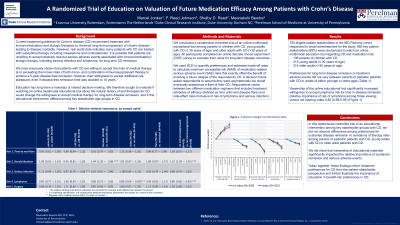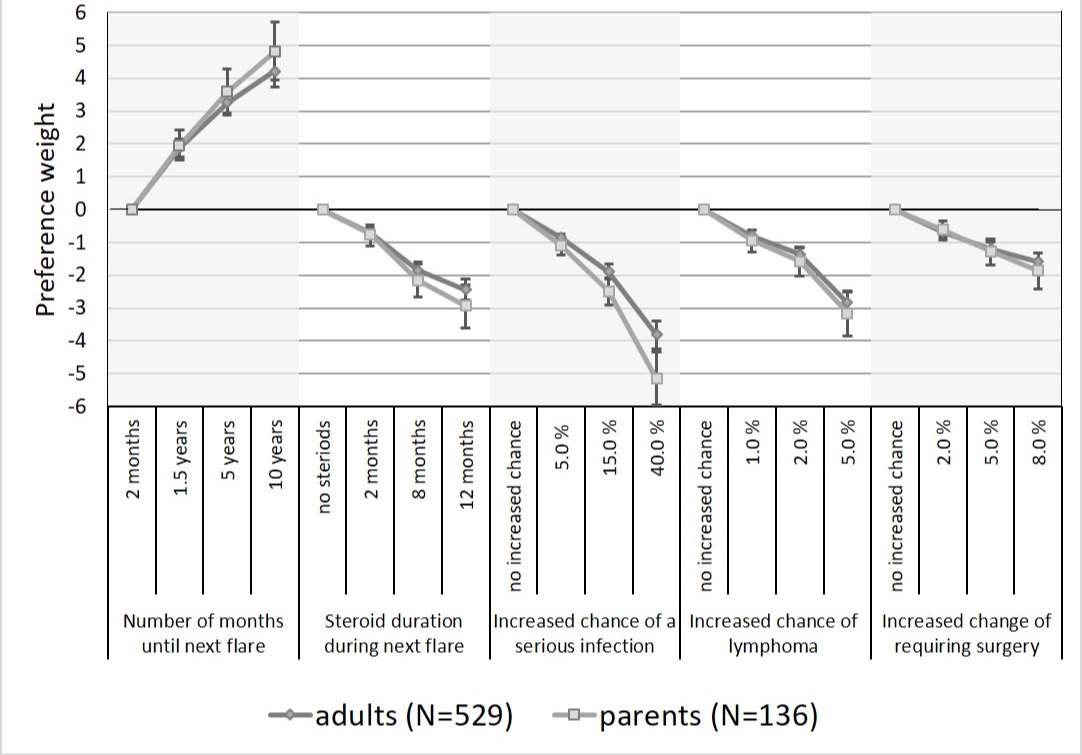Tuesday Poster Session
Category: IBD
P4344 - A Randomized Trial of Education on Valuation of Future Medication Efficacy Among Patients With Crohn’s Disease
Tuesday, October 29, 2024
10:30 AM - 4:00 PM ET
Location: Exhibit Hall E

Has Audio

Meenakshi Bewtra, MD, PhD, MPH
University of Pennsylvania
Philadelphia, PA
Presenting Author(s)
Marcel Jonker, PhD1, Shelby D. Reed, PhD2, F. Reed Johnson, PhD3, Meenakshi Bewtra, MD, PhD, MPH4
1Erasmus University, Rotterdam, Zuid-Holland, Netherlands; 2Duke Clinical Research Institute, Durham, NC; 3Duke University School of Medicine, Durham, NC; 4University of Pennsylvania, Philadelphia, PA
Introduction: Treatment paradigms have shifted in Crohn’s disease (CD) to emphasize sustained deep remission and medication efficacy. Prior work has indicated that adult CD patients place more value on avoiding therapy-associated risk than sustained disease remission. Little is known about how these preferences vary by age (young vs old) or by parents of children with CD versus adults. We sought to quantify the impact an educational tool has on risk tolerance for long-term remission in key patient stakeholder groups in CD.
Methods: 750 eligible patient stakeholders in the IBD Partners cohort responded to email advertisement for the study. 665 key patient stakeholders (136 parents of children with CD, 215 young adults (≤ 30 years of age) and 314 older adults ( >30 years of age); 89% response rate) were randomized to watch an online multimodal educational tool regarding Crohn’s disease and medication risk. All participants completed an online discrete choice experiment (DCE) survey to evaluate their value for long-term disease outcomes.
Results: Preferences for long-term disease remission or treatment adverse events did not vary between parents of pediatric patients with CD or adults of either younger or older ages (Table 1). Viewership of the online educational tool significantly increased willingness to accept lymphoma risk for time in disease remission (relative importance of risk of lymphoma among those viewing versus not viewing video 0.80 (0.69-0.95) (Figure 1).
Discussion: We did not observe differences among preferences for sustained disease remission or avoidance of therapy risks among parents of pediatric patients with CD, young adults with CD or older adult patients with CD. We did show that viewership of educational materials significantly impacted the relative importance of sustained remission and serious adverse events. Taken together, these findings inform treatment preferences for CD from the patient-stakeholder perspective and further illustrate the importance of education in benefit-risk preferences in CD.

Note: The table for this abstract can be viewed in the ePoster Gallery section of the ACG 2024 ePoster Site or in The American Journal of Gastroenterology's abstract supplement issue, both of which will be available starting October 27, 2024.
Disclosures:
Marcel Jonker, PhD1, Shelby D. Reed, PhD2, F. Reed Johnson, PhD3, Meenakshi Bewtra, MD, PhD, MPH4. P4344 - A Randomized Trial of Education on Valuation of Future Medication Efficacy Among Patients With Crohn’s Disease, ACG 2024 Annual Scientific Meeting Abstracts. Philadelphia, PA: American College of Gastroenterology.
1Erasmus University, Rotterdam, Zuid-Holland, Netherlands; 2Duke Clinical Research Institute, Durham, NC; 3Duke University School of Medicine, Durham, NC; 4University of Pennsylvania, Philadelphia, PA
Introduction: Treatment paradigms have shifted in Crohn’s disease (CD) to emphasize sustained deep remission and medication efficacy. Prior work has indicated that adult CD patients place more value on avoiding therapy-associated risk than sustained disease remission. Little is known about how these preferences vary by age (young vs old) or by parents of children with CD versus adults. We sought to quantify the impact an educational tool has on risk tolerance for long-term remission in key patient stakeholder groups in CD.
Methods: 750 eligible patient stakeholders in the IBD Partners cohort responded to email advertisement for the study. 665 key patient stakeholders (136 parents of children with CD, 215 young adults (≤ 30 years of age) and 314 older adults ( >30 years of age); 89% response rate) were randomized to watch an online multimodal educational tool regarding Crohn’s disease and medication risk. All participants completed an online discrete choice experiment (DCE) survey to evaluate their value for long-term disease outcomes.
Results: Preferences for long-term disease remission or treatment adverse events did not vary between parents of pediatric patients with CD or adults of either younger or older ages (Table 1). Viewership of the online educational tool significantly increased willingness to accept lymphoma risk for time in disease remission (relative importance of risk of lymphoma among those viewing versus not viewing video 0.80 (0.69-0.95) (Figure 1).
Discussion: We did not observe differences among preferences for sustained disease remission or avoidance of therapy risks among parents of pediatric patients with CD, young adults with CD or older adult patients with CD. We did show that viewership of educational materials significantly impacted the relative importance of sustained remission and serious adverse events. Taken together, these findings inform treatment preferences for CD from the patient-stakeholder perspective and further illustrate the importance of education in benefit-risk preferences in CD.

Figure: Figure 1: Preference weights by educational video
Note: The table for this abstract can be viewed in the ePoster Gallery section of the ACG 2024 ePoster Site or in The American Journal of Gastroenterology's abstract supplement issue, both of which will be available starting October 27, 2024.
Disclosures:
Marcel Jonker indicated no relevant financial relationships.
Shelby Reed: Abbott Vascular – Grant/Research Support. Bayer AG – Grant/Research Support. GSK – Grant/Research Support. Janssen R&D – Grant/Research Support. Novartis – Grant/Research Support. Sage Therapeutics – Advisory Committee/Board Member.
F. Reed Johnson: Abbott – Grant/Research Support. Janssen – Grant/Research Support. Merck – Grant/Research Support. Pfizer – Grant/Research Support. Takeda – Grant/Research Support.
Meenakshi Bewtra: Iterative Health – Grant/Research Support. Johnson & Johnson – Grant/Research Support. MedEd Consultant – Speakers Bureau. Pfizer – Advisory Committee/Board Member.
Marcel Jonker, PhD1, Shelby D. Reed, PhD2, F. Reed Johnson, PhD3, Meenakshi Bewtra, MD, PhD, MPH4. P4344 - A Randomized Trial of Education on Valuation of Future Medication Efficacy Among Patients With Crohn’s Disease, ACG 2024 Annual Scientific Meeting Abstracts. Philadelphia, PA: American College of Gastroenterology.

